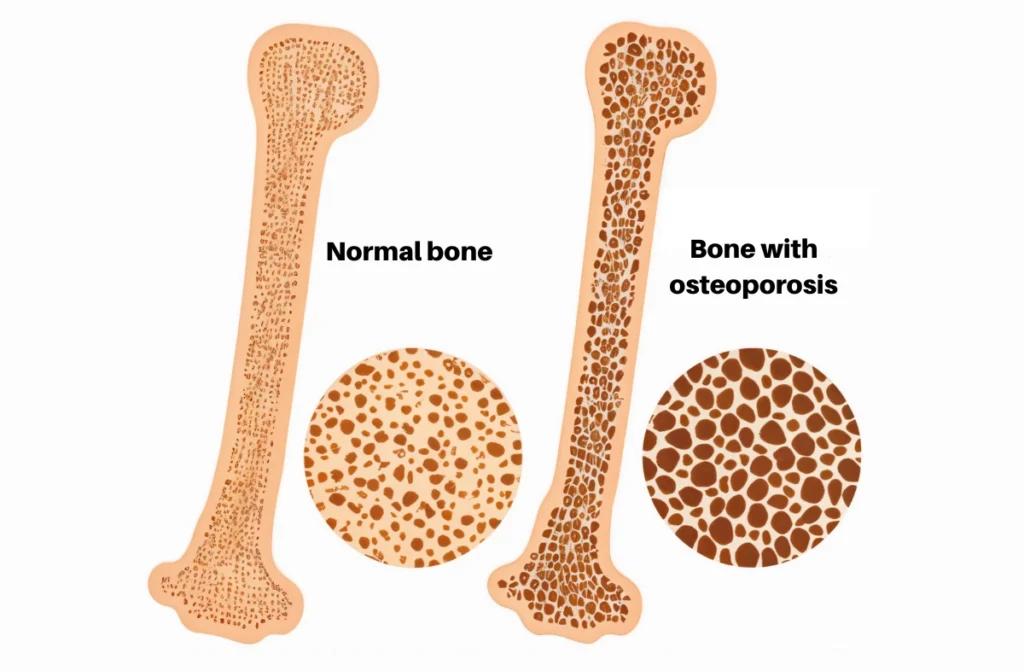How to improve bone health is an important topic for anyone wanting to live a strong, active life. From children to the elderly, everyone benefits from healthy bones, as they provide structure, protect organs, and store essential minerals like calcium and phosphorus. At CTS Hospital, we prioritize helping individuals understand what supports bone health and the steps they can take to maintain it. In this blog, we’ll dive deep into why bone health matters and how you can take control of it today.
Why Is Bone Health Important?
Why bone health is important goes beyond preventing fractures. Bones are constantly changing, breaking down old tissue and creating new. By understanding how to improve bone health, you can build a foundation for lifelong strength. At CTS Hospital, our experts emphasize that bone health plays a role in maintaining mobility, reducing the risk of osteoporosis, and improving overall quality of life. Knowing what supports bone health empowers you to make smart choices.
Key points:
- Strong bones reduce the risk of fractures, especially as you age.
- Bones store essential minerals, which the body uses for various functions like muscle contractions and nerve communication.
- Healthy bones support posture and balance, preventing falls and injuries.

What Affects Bone Health?
To fully grasp how to improve bone health, it’s important to know what can harm it. Factors like age, genetics, nutrition, and lifestyle choices all play a role. For example, bone density peaks in your 20s, and then it naturally declines. At CTS Hospital, we help patients identify risks early and offer guidance on what supports bone health to mitigate damage.
Factors include:
- Calcium and Vitamin D deficiency: These are the building blocks for strong bones.
- Physical inactivity: Without regular exercise, bones can lose density.
- Smoking and alcohol: Both weaken bones over time.
- Hormonal changes: Especially in women during menopause, which accelerates bone loss.
What Can I Do to Keep My Bones Healthy?
If you’re wondering what supports bone health, start by taking small but impactful steps in your daily routine. At CTS Hospital, we guide patients on the most effective habits for maintaining bone health. This includes a balanced diet, regular exercise, and managing risk factors like smoking. Women often ask how to improve bone health in women, and our advice is tailored to their specific needs.
Tips to keep bones healthy:
- Why it’s essential: Calcium is the building block of bones. Without sufficient calcium, your body pulls it from your bones to support other functions, weakening them over time.
- How to meet the requirement: Adults need 1,000–1,200 mg daily. You can get this from dairy products like milk, yogurt, and cheese, as well as plant-based options like fortified almond milk or tofu. Dark leafy greens like kale, broccoli, and spinach are also excellent sources.
- Supplementation tips: If your diet falls short, calcium supplements can be a good backup. However, take them with meals for better absorption and avoid exceeding recommended doses to prevent kidney stones.
11 Ways to Increase Bone Density Naturally
Maintaining strong bones is essential for overall health and mobility. Below are 11 effective ways to naturally enhance bone density and prevent conditions like osteoporosis.
Increase Calcium Intake
Calcium is a key mineral for bone strength and density.
- Consume dairy products, leafy greens, and nuts.
- Opt for calcium-fortified foods.
- Ensure daily intake meets recommended levels.
Adequate calcium is crucial for how to improve bone health in women and prevent bone loss.
Get Enough Vitamin D
Vitamin D aids calcium absorption, making it essential for strong bones.
- Spend time in sunlight for natural vitamin D.
- Eat fatty fish, eggs, and fortified foods.
- Take supplements if needed.
Vitamin D deficiency can weaken bones, increasing fracture risks.
Perform Weight-Bearing Exercises
Exercise stimulates bone growth and strengthens muscles.
- Engage in walking, running, and resistance training.
- Try yoga and Pilates for flexibility.
- Strength training improves bone density.
Regular physical activity is a vital step in how to improve bone health in women.
Eat Magnesium-Rich Foods
Magnesium supports calcium absorption and bone strength.
- Include nuts, seeds, and whole grains in your diet.
- Dark leafy greens provide natural magnesium.
- Avoid processed foods that deplete magnesium levels.
This nutrient plays a key role in bone health.
Increase Protein Intake
Protein is essential for maintaining bone structure.
- Eat lean meats, fish, dairy, and legumes.
- Ensure a balanced diet with adequate protein.
- Avoid excessive protein, which may lead to calcium loss.
Proper protein consumption supports bone health at all ages.
Consume Foods Rich in Vitamin K
Vitamin K helps regulate bone metabolism.
- Eat green leafy vegetables like kale and spinach.
- Include fermented foods like natto for better absorption.
- Supports bone mineralization and reduces fracture risk.
This vitamin is important for how to improve bone health in women.
Limit Caffeine Consumption
Excessive caffeine can reduce calcium absorption.
- Avoid drinking too much coffee and soda.
- Choose herbal teas or decaffeinated alternatives.
- Maintain a balanced diet to offset calcium loss.
Moderation is key to maintaining strong bones.
Reduce Alcohol Intake
Alcohol weakens bones and increases fracture risks.
- Limit alcohol consumption to moderate levels.
- Opt for bone-healthy beverages like milk or green tea.
- Excessive drinking leads to poor bone health.
Cutting back on alcohol helps maintain bone density.
Quit Smoking
Smoking negatively impacts bone health.
- Reduces calcium absorption and bone formation.
- Increases the risk of osteoporosis and fractures.
- Quitting smoking promotes overall health benefits.
A smoke-free lifestyle supports stronger bones.
Maintain a Healthy Weight
Being underweight increases fracture risk, while obesity stresses bones.
- Maintain a balanced diet and healthy lifestyle.
- Engage in regular physical activity.
- Avoid extreme dieting that affects bone mass.
Healthy weight management is crucial for strong bones.
Consider Bone Health Supplements
Supplements can help meet nutritional needs.
- Take calcium, vitamin D, and magnesium supplements if necessary.
- Consult a doctor before starting any supplement.
- Supplements can aid in how to improve bone health in women.
A well-rounded diet combined with supplementation ensures optimal bone strength.
What are the symptoms of poor bone health?
- Persistent, deep bone pain that worsens with activity or at night. This may feel different from muscle soreness and often lingers after minor bumps. Recurrent shin, hip, or back discomfort suggests structural weakening rather than simple strain.
- Frequent fractures or stress injuries from low-impact activities. Breaking a wrist after a stumble or developing foot fractures from walking indicates compromised mineral density and microarchitectural damage within the skeleton. Persistent shin splints warrant evaluation.
- Loss of height or a stooped posture over months. Vertebral compression from thinning bones can subtly shorten stature, produce a rounded upper back, and cause nerve irritation with tingling or radiating chest and abdomen pain.
- Poor grip strength, brittle nails, and dental issues. These visible clues often accompany fatigue and slow recovery from exercise. If you wonder how to increase bone strength naturally or how to make bones and joints strong, these signs mean assessment is wise.
What factors put bone health at risk?
- Low calcium and vitamin D intake, restrictive diets, or malabsorption from gut disorders and bariatric surgery. Medications like steroids, proton-pump inhibitors, and some anticonvulsants accelerate bone loss, especially at the hip. Ask a professional about how to improve calcium in our body while balancing medication needs.
- Sedentary lifestyle, smoking, and excess alcohol. Sitting reduces the signals bones need to remodel, while toxins impair osteoblast function. Small, regular habits can show how to make muscles and bones strong without complicated equipment.
- Hormonal changes: menopause, low testosterone, thyroid excess, or elevated cortisol. Chronic inflammatory conditions such as rheumatoid arthritis or celiac disease also increase resorption and reduce formation, compounding fragility over time if uncorrected.
- Genetic predisposition, petite frame, and previous fractures. People with eating disorders or chronic kidney disease carry additional risk. Falls, poor vision, and neuropathy create a dangerous cycle where minor slips cause major injuries, especially in older adults.
What happens to my bones as I get older?
- Bone mass peaks in early adulthood, then gradually declines. With age, remodeling cycles favor resorption, leaving thinner trabeculae and wider pores. Microcracks accumulate, and the spine and hip become especially vulnerable to overload during routine everyday activities—chores.
- Muscle power drops faster than strength, undermining balance and reaction time. Sarcopenia increases falls and reduces joint protection. Targeted training explains how to strengthen bones and joints naturally through better coordination, speed, and tendon stiffness.
- Estrogen and testosterone fall, particularly after menopause, accelerating turnover. Vitamin D synthesis in skin declines, impairing calcium absorption and bone mineralization. These shifts clarify how to increase bone strength naturally by addressing hormones, sunlight, and nutrient delivery in a coordinated plan.
- Cartilage hydration decreases, and menisci stiffen. Discs lose height, altering posture and gait. Combined with slower nerve conduction, this makes uneven ground treacherous and turns ordinary tasks into fracture-risk events, especially during multitasking or fatigue.
How can I naturally maintain strong bones and joints?
- Lift weights two to three days weekly and practice impact: brisk walking, stair climbs, hops, or light jogging as tolerated. Couple this with balance drills and hip-dominant movements. This is how to make muscles and bones strong while protecting joints consistently.
- Prioritize protein at each meal, add dairy or fortified alternatives, nuts, and leafy greens. Discuss supplements if intake is low. These steps reinforce calcium status and ensure magnesium, vitamin K2, and vitamin D support absorption.
- Get morning sunlight, sleep seven to nine hours, and limit smoking and alcohol. Progressively overload exercises, track steps, and use a lifting log. Such consistency shows how to make bones and joints strong through adaptable, sustainable routines.
- Build a fall-safe home: clear clutter, add grab bars, improve lighting, and use proper footwear. Learn safe lifting mechanics and practice getting up from the floor. Small environmental tweaks yield big protection over a lifetime.
When should I see my doctor?
- Dizziness, frequent falls, or progressive stoop. A comprehensive assessment of gait, vision, medications, and home hazards prevents injuries. If you are unsure about next steps, structured programs translate advice into stepwise action with measurable milestones.
- After any low-impact fracture, height loss, or recurring back pain. Early scans and labs reveal loss and secondary causes and nutrient deficiencies. Prompt evaluation guides how to improve calcium in our body alongside targeted therapy, fall-prevention strategies, and lifestyle upgrades.
- Menopause before average age, irregular periods, or low libido in men. Endocrine issues harm bone quickly and silently. Professional guidance on how to strengthen bones and joints naturally aligns hormones, nutrition, and exercise to reduce imminent fracture risk.
- Long-term steroid use, stomach surgery, bowel disease, kidney or thyroid disorders. These conditions alter absorption, turnover, and acid-base balance. Specific plans outline ways to build muscle and bone strength without aggravating comorbidities or pain.
Conclusion
How to improve bone health begins with awareness and action. By incorporating the right diet, exercise, and lifestyle changes, you can strengthen your bones and enjoy a healthier future. At CTS Hospital, we’re committed to providing the best guidance on what supports bone health and helping women address specific challenges related to bone health. For more details, contact us today and take the first step toward better bone health!
